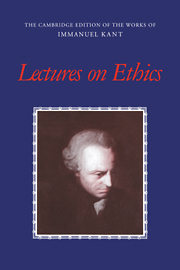Book contents
- Frontmatter
- Contents
- General editors' preface
- Acknowledgments
- Introduction by J. B. Schneewind
- PART I Kant's practical philosophy: Herder's lecture notes (selections)
- PART II Moral Philosophy: Collins's lecture notes
- PART III Morality according to Prof. Kant: Mrongovius's second set of lecture notes (selections)
- PART IV Kant on the metaphysics of morals: Vigilantius's lecture notes
- Select Bibliography
- Explanations of names
- German-English glossary
- English-German glossary
- Name index
- Subject index
PART II - Moral Philosophy: Collins's lecture notes
Published online by Cambridge University Press: 05 May 2013
- Frontmatter
- Contents
- General editors' preface
- Acknowledgments
- Introduction by J. B. Schneewind
- PART I Kant's practical philosophy: Herder's lecture notes (selections)
- PART II Moral Philosophy: Collins's lecture notes
- PART III Morality according to Prof. Kant: Mrongovius's second set of lecture notes (selections)
- PART IV Kant on the metaphysics of morals: Vigilantius's lecture notes
- Select Bibliography
- Explanations of names
- German-English glossary
- English-German glossary
- Name index
- Subject index
Summary
[On universal practical philosophy]
PROEM
All philosophy is either theoretical or practical. Theoretical philosophy is the rule of knowledge, practical the rule of behaviour in regard to free choice The difference between theoretical and practical philosophy is in the object. The one has theory for its object, and the other practice. Philosophy is otherwise divided into speculative and practical. Sciences are in general called theoretical and practical, be the objects what they may. They are theoretical if they are the ground of concepts of the objects, but practical if they are the ground of exercising knowledge of the objects; thus there is, for example, a theoretical and a practical geometry, a theoretical and a practical mechanics, a theoretical and a practical medicine, and a theoretical and a practical jurisprudence: the object is always the same. So if, regardless of the object, the sciences are nevertheless theoretical and practical, it has to do merely with the form of the science, the theoretical being for judgement of the object, and the practical for producing it. But in the present case there is a difference between theoretical and practical in regard to the object. Practical philosophy is practical not by form, but by the object, and this object is free acts and free behaviour. The theoretical is knowing, and the practical is behaving. If I abstract from the particular matter in hand, the philosophy of behaviour is that which gives a rule for the proper use of freedom, and this is the object of practical philosophy, without regard to particulars.
- Type
- Chapter
- Information
- Lectures on Ethics , pp. 37 - 222Publisher: Cambridge University PressPrint publication year: 1997
- 8
- Cited by



